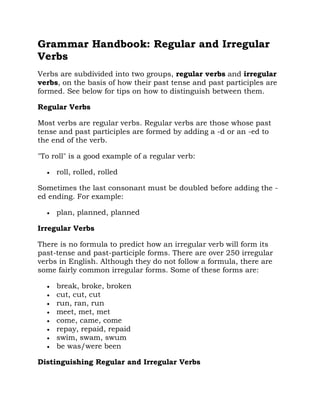Report
Share

Recommended
Recommended
More Related Content
Viewers also liked
Viewers also liked (8)
A comprehensive grammar of the english language quirk greenbaum leech svartvik

A comprehensive grammar of the english language quirk greenbaum leech svartvik
Similar to Verbs
Similar to Verbs (20)
Categories of verb forms a new approach- author.v.mahendiran

Categories of verb forms a new approach- author.v.mahendiran
Verbs
- 1. Grammar Handbook: Regular and Irregular Verbs Verbs are subdivided into two groups, regular verbs and irregular verbs, on the basis of how their past tense and past participles are formed. See below for tips on how to distinguish between them. Regular Verbs Most verbs are regular verbs. Regular verbs are those whose past tense and past participles are formed by adding a -d or an -ed to the end of the verb. "To roll" is a good example of a regular verb: roll, rolled, rolled Sometimes the last consonant must be doubled before adding the - ed ending. For example: plan, planned, planned Irregular Verbs There is no formula to predict how an irregular verb will form its past-tense and past-participle forms. There are over 250 irregular verbs in English. Although they do not follow a formula, there are some fairly common irregular forms. Some of these forms are: break, broke, broken cut, cut, cut run, ran, run meet, met, met come, came, come repay, repaid, repaid swim, swam, swum be was/were been Distinguishing Regular and Irregular Verbs
- 2. Dictionaries are perhaps the most valuable tool one can use in distinguishing between regular and irregular verbs. If only one form of the verb is listed, the verb is regular. If the verb is irregular, the dictionary will list the principal parts of the other forms.
